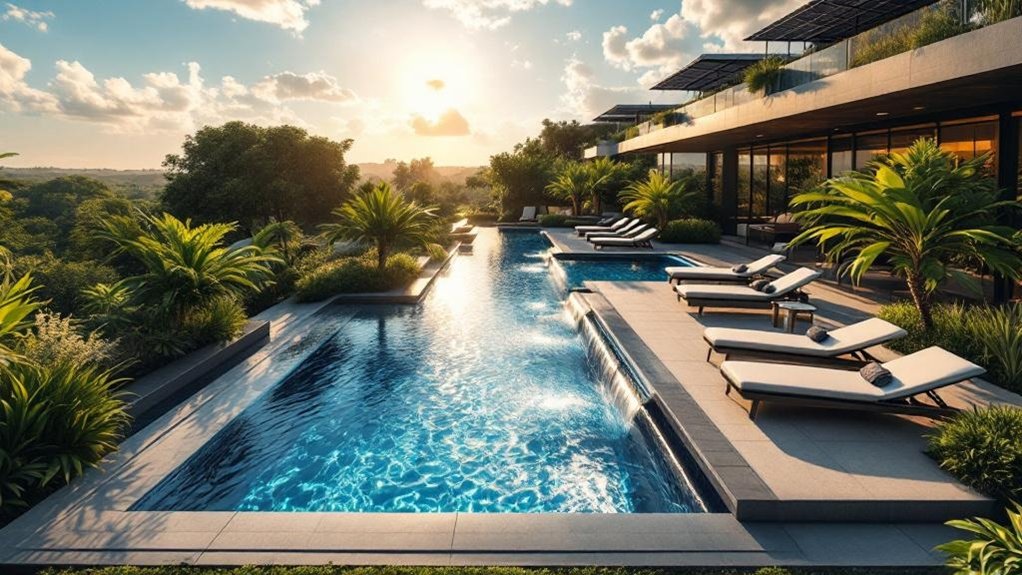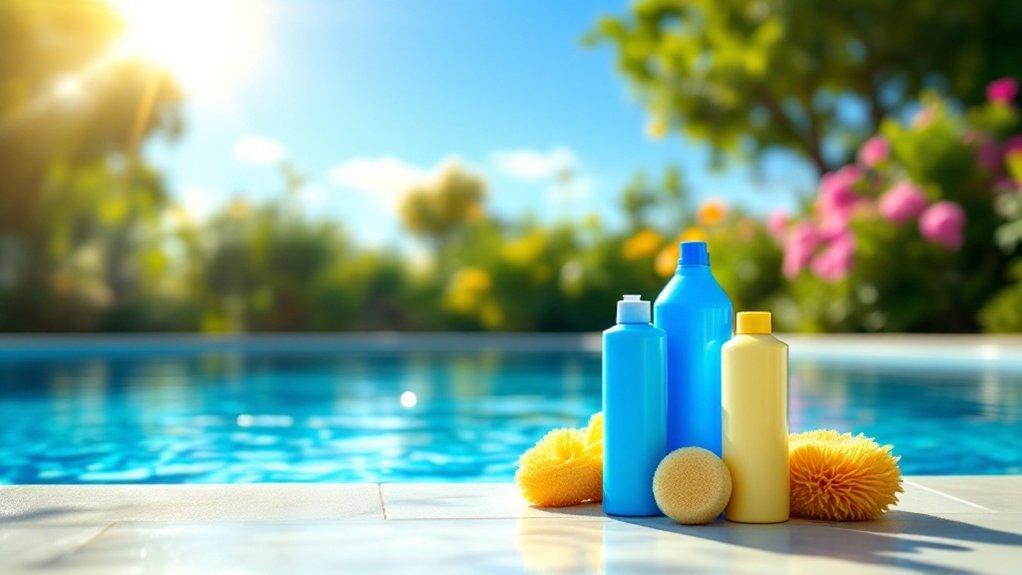Sustainable swimming pool design is increasingly relevant for eco-conscious homeowners. By prioritizing energy efficiency and natural materials, these pools can blend seamlessly with the environment. Innovations like biological filtration systems and solar-powered equipment minimize ecological impact. However, the choices don’t stop there. Various techniques and technologies offer even greater sustainability benefits. Exploring these options can reveal pathways to a more responsible pool experience. What strategies might redefine outdoor leisure for the eco-friendly homeowner?
Energy-Efficient Pool Heating Solutions
As homeowners increasingly prioritize sustainability, energy-efficient pool heating solutions have emerged as essential components of modern swimming pool design. These systems utilize advanced technologies such as heat pumps, solar panels, and gas heaters with high efficiency ratings to reduce energy consumption. Heat pumps extract warmth from the air, while solar heaters harness sunlight, offering a renewable energy source for maintaining comfortable water temperatures. These options not only lower utility bills but also minimize environmental impact, aligning with eco-friendly living practices. Additionally, incorporating smart thermostats allows for optimized temperature control, further enhancing energy efficiency. By choosing these sustainable heating solutions, homeowners contribute to a greener future while enjoying their swimming pools year-round. Furthermore, gas pool heaters provide dependable performance regardless of the outside temperature, ensuring that pools remain inviting throughout the year.
Natural Swimming Pools: A Chlorine-Free Alternative
Natural swimming pools offer an appealing chlorine-free alternative for those seeking a more eco-friendly and health-conscious option for aquatic enjoyment. These pools utilize a biological filtration system that mimics natural ecosystems, promoting clean water through the use of plants and beneficial bacteria. By avoiding harsh chemicals, natural swimming pools provide a gentler experience for swimmers, reducing skin and eye irritation. Additionally, they blend seamlessly with the surrounding landscape, enhancing the aesthetic appeal of any home. Maintenance of these pools involves regular monitoring of water quality and plant health, but many owners appreciate the low environmental impact. This sustainable choice not only supports biodiversity but also encourages a connection with nature, making it a popular option for eco-conscious homeowners.
Solar-Powered Pool Equipment
Solar-powered pool equipment offers an eco-friendly approach to maintaining swimming pools. Solar heating systems can considerably reduce energy costs while providing comfortable water temperatures. Additionally, energy-efficient pumps enhance overall sustainability by minimizing electricity usage.
Solar Heating Systems
Harnessing the sun’s energy, solar heating systems offer an eco-friendly solution for maintaining comfortable water temperatures in swimming pools. These systems typically consist of solar panels or collectors installed on rooftops or nearby areas, which absorb sunlight and convert it into heat. The heated water is then circulated through the pool, providing warmth while minimizing reliance on conventional energy sources. Solar heating systems are not only sustainable but also cost-effective in the long run, as they considerably reduce utility bills. Additionally, they contribute to a reduced carbon footprint, aligning with eco-friendly home practices. By integrating solar heating, homeowners can enjoy longer swimming seasons while promoting environmental responsibility and energy efficiency.
Energy-Efficient Pumps
While traditional pool pumps can consume considerable amounts of electricity, energy-efficient pumps, particularly those powered by solar energy, present a sustainable alternative. Solar-powered pool equipment harnesses sunlight to operate pumps, reducing reliance on grid electricity and minimizing environmental impact. These systems typically include solar panels that convert sunlight into energy to power the pump, ensuring efficient circulation and filtration of pool water. Additionally, many modern solar pumps are designed with variable speed settings, allowing users to optimize energy usage based on pool size and specific needs. As a result, homeowners can enjoy lower energy bills while contributing to a greener planet. Overall, incorporating solar-powered pumps into pool design greatly enhances sustainability and efficiency.
Eco-Friendly Pool Materials and Finishes
As homeowners increasingly prioritize sustainability, the choice of eco-friendly pool materials and finishes becomes essential in pool design. Natural stone, reclaimed wood, and recycled glass tiles are popular options that minimize environmental impact while enhancing aesthetic appeal. These materials not only reduce the carbon footprint but also provide durability and low maintenance. Additionally, choosing non-toxic sealants and finishes guarantees that harmful chemicals do not leach into the surrounding ecosystem. Eco-friendly alternatives, such as permeable pool decking made from recycled rubber or composite materials, promote water drainage and prevent erosion. By integrating sustainable materials into pool construction, homeowners can create a beautiful outdoor space that aligns with their commitment to environmental stewardship, ultimately contributing to a healthier planet.
Innovative Water Conservation Techniques
Incorporating innovative water conservation techniques into pool design complements the use of eco-friendly materials, additionally enhancing sustainability efforts. One effective method is the installation of a rainwater harvesting system, which collects and stores rainwater for pool maintenance. Additionally, utilizing a pool cover reduces evaporation, conserving water while maintaining temperature. Smart filtration systems can also minimize water waste by optimizing cleaning cycles. Implementing a splash pad with a recirculating water system not only entertains but also reduces overall water usage. Moreover, incorporating drought-resistant landscaping around the pool can mitigate water runoff, contributing to a more sustainable environment. These techniques collectively promote responsible water management, ensuring that swimming pools can be enjoyed without compromising ecological integrity.
Sustainable Landscaping Around Your Pool
Sustainable landscaping around a pool can enhance both aesthetics and environmental responsibility. The use of native plant selection promotes biodiversity and reduces the need for extensive watering, while water-efficient irrigation systems optimize resource use. Together, these strategies contribute to a more eco-friendly outdoor space.
Native Plant Selection
How can native plants enhance the aesthetic and ecological value of a swimming pool area? Incorporating native plants into the landscaping around a swimming pool creates a harmonious environment that blends seamlessly with the local ecosystem. These plants require less water and maintenance, making them an eco-friendly choice that supports sustainability. Their natural resilience to local pests and diseases reduces the need for chemical treatments, promoting a healthier outdoor space. Additionally, native flora attracts beneficial wildlife, such as pollinators, which can enhance the ecological balance. The diverse textures and colors of native plants can also add visual interest, creating a serene and inviting atmosphere around the pool. Ultimately, native plant selection enriches both the beauty and sustainability of the swimming pool landscape.
Water-Efficient Irrigation Systems
The integration of native plants around a swimming pool not only enhances its visual appeal but also sets the stage for implementing water-efficient irrigation systems. These systems considerably reduce water usage while maintaining the health of the surrounding landscape. Techniques such as drip irrigation deliver water directly to the plant roots, minimizing evaporation and runoff. Rainwater harvesting systems can be utilized to collect and store rainwater for irrigation purposes, further promoting sustainability. Additionally, smart irrigation controllers can adjust watering schedules based on weather conditions, ensuring ideal moisture levels without waste. By incorporating these efficient systems, homeowners can enjoy a beautiful poolside environment while conserving water resources and supporting eco-friendly practices in their landscaping efforts.
Smart Pool Technologies for Energy Management
As pool owners increasingly seek to reduce their energy consumption, smart pool technologies have emerged as essential tools for efficient energy management. These innovations encompass automated systems that monitor and control various pool functions, such as heating, filtration, and lighting. By utilizing sensors and timers, these technologies enable users to optimize energy use based on real-time data and personal preferences. Smart pool pumps, for instance, adjust their operation based on demand, considerably lowering electricity costs. Additionally, mobile applications allow homeowners to manage their pool settings remotely, facilitating better energy conservation. Integrating solar energy solutions further enhances sustainability, reducing reliance on traditional power sources. Ultimately, these smart technologies contribute to a more eco-friendly pool experience while minimizing environmental impact. Regular service and maintenance are also crucial for ensuring optimal performance and longevity of these smart systems, as they help maintain water quality maintenance and extend equipment lifespan.
The Benefits of Rainwater Harvesting for Pool Use
While many pool owners focus on energy-efficient technologies, incorporating rainwater harvesting into pool maintenance offers significant environmental and economic benefits. Utilizing collected rainwater for pool filling and maintenance reduces reliance on municipal water systems, thereby lowering water bills and conserving essential resources. This eco-friendly practice minimizes stormwater runoff, which can lead to urban flooding and pollution. Furthermore, rainwater is naturally soft and free from chemicals, improving water quality and reducing the need for additional chemical treatments. By integrating rainwater harvesting systems, homeowners can create a sustainable pool environment while supporting local ecosystems. Overall, adopting this approach contributes to a more responsible and sustainable lifestyle, aligning with the growing trend of eco-conscious living.
Frequently Asked Questions
How Can I Maintain Water Quality in a Natural Swimming Pool?
To maintain water quality in a natural swimming pool, regular monitoring of pH levels, introducing beneficial plants, and ensuring proper circulation are essential. Additionally, routine cleaning and avoiding chemical treatments contribute to a balanced ecosystem.
What Are the Costs Associated With Building a Sustainable Pool?
The costs associated with building a sustainable pool can vary considerably. Factors such as materials, technology, landscaping, and ongoing maintenance contribute to the overall investment, often resulting in initial expenses that exceed traditional pool construction.
Can I Retrofit My Existing Pool to Be More Eco-Friendly?
Retrofitting an existing pool to enhance eco-friendliness is feasible. Homeowners can implement energy-efficient pumps, solar heating, and natural filtration systems, greatly reducing water and energy consumption while promoting a healthier swimming environment for users.
What Plants Are Best for Sustainable Landscaping Around Pools?
When considering plants for sustainable landscaping around pools, native species, drought-resistant varieties, and low-maintenance ground covers are ideal. These selections enhance biodiversity, reduce water usage, and create a harmonious aesthetic without excessive resource demands.
How Do I Ensure My Pool Meets Local Environmental Regulations?
To guarantee compliance with local environmental regulations, individuals should research applicable laws, consult with local authorities, and consider hiring professionals who specialize in pool design and environmental standards to ensure all requirements are met effectively.
Conclusion
Incorporating sustainable swimming pool design ideas not only enhances the aesthetic appeal of eco-friendly homes but also promotes environmental responsibility. By embracing energy-efficient heating solutions, natural filtration systems, and eco-friendly materials, homeowners can create a harmonious outdoor space that minimizes their ecological footprint. Additionally, innovative water conservation techniques and smart technologies further optimize resource management. Ultimately, these sustainable practices contribute to a healthier planet while providing a serene oasis for relaxation and enjoyment.




